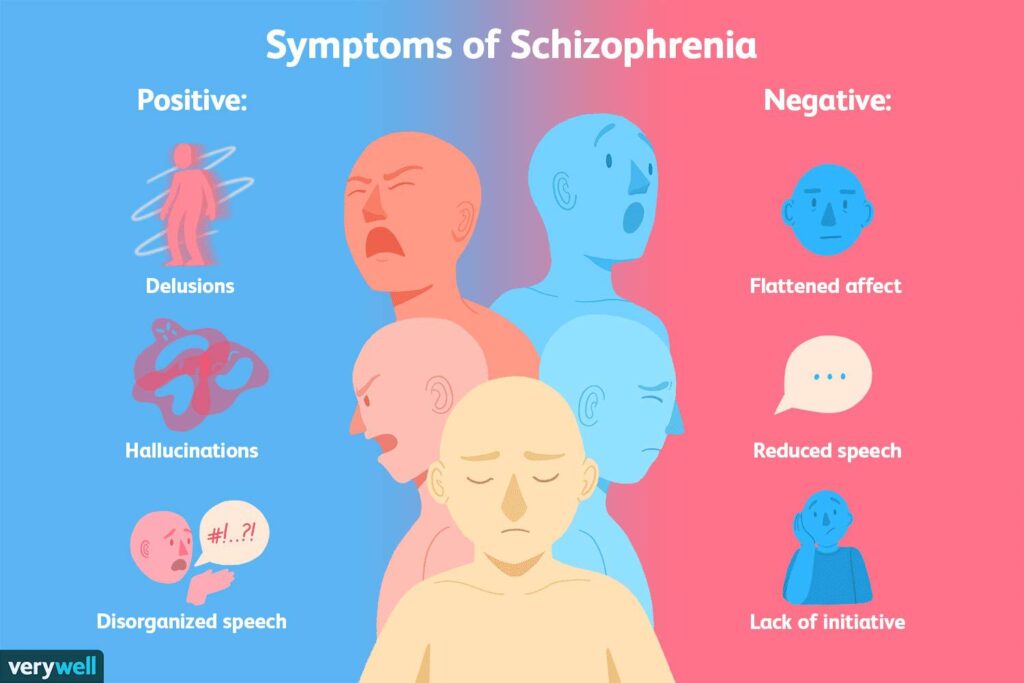SCHIZOPHRENIA
-By Eesha Madan
1) Key facts:
1.1 Schizophrenia does not involve split personalities.
1.2 Symptoms of schizophrenia usually emerge in adolescence.
1.3 Schizophrenia has both genetic and environmental causes.
1.4 The only way to diagnose schizophrenia is through a combination of tests.
1.5 Schizophrenia causes psychosis and is associated with considerable disability, potentially affecting all areas of life including personal, family, social, educational, and occupational functioning.
2) What is “Schizophrenia”?
Schizophrenia is a complex, chronic mental health disorder characterized by an array of symptoms, including delusions, hallucinations, disorganized speech or behavior, and impaired cognitive ability.
In clinical settings, schizophrenia is ordinarily diagnosed through the observation of positive symptoms (delusions, hallucinations, disordered speech, and behavioral disturbances) and negative symptoms (a volition, alogia, and anhedonia). However, schizophrenia has considerable overlap with other neurological disorders (e.g., bipolar disorder, autism spectrum disorder, and Huntington’s disease) at both the clinical and genetic levels. The study of schizophrenia is important because it can help us understand the brain and mind, the biological nature of the disorder, and the severity of its symptoms
3) What are the symptoms of Schizophrenia
The symptoms of schizophrenia can be divided into three categories:
- 3.1 Positive symptoms (i.e. excesses of thoughts, emotions & behaviour )
- 3.2 Negative symptoms (i.e. deficits of thoughts, emotions & behaviour)
- 3.3 Psychomotor symptoms
3.1 Positive Symptoms:
Positive symptoms of schizophrenia include hallucinations, delusions, and any changes in thoughts or behaviours. Positive symptoms are those that affect the individual’s thoughts or behaviours. They are pathological and bizarre additions to a person’s behaviour: delusions, disorganized thinking and speech.
3.1.1 Delusions :
Delusions are fixed, false beliefs that conflict with reality. If a person is delusional, they can not let go of their untrue convictions despite contrary evidence.
Types of delusions:
- Delusions of persecution: Most common in schizophrenia. People with this delusion believe they are being plotted against, spied on, slandered, threatened, attacked or deliberately victimized.
- Delusions of reference: In which they attach special and personal meaning to the actions of others.
- Delusions of grandeur: People believe themselves to be specially empowered persons.
- Delusions of control: They believe that their feelings, thoughts and actions are controlled by others.
- Erotomanic: Believing someone else is in love with you is an Erotomanic delusion. For example, an Erotomanic delusion might include thinking a celebrity loves you even when you’ve never met or corresponded.
- Nihilistic delusions: they get their name from the philosophical concept of nihilism, which suggests life has no fundamental meaning or purpose. Nihilistic delusions involve thoughts related to non-existence, like believing a major catastrophe will occur or that humanity is already in the afterlife.
- Somatic delusions: It involves a preoccupation with health and organ function. They can include irrational beliefs about how your body functions or inaccurate beliefs about how natural sensations predict illnesses—for example, attributing the typical sensation of hunger to progressive stomach cancer.
- Bizarre delusions: This includes any false belief that is completely implausible, isn’t derived from ordinary life experiences, and isn’t seated in cultural practices.
3.1.2 Formal thought disorder:
People aren’t able to think logically and they may speak in peculiar ways, so this disorder can make communication extremely difficult. This includes rapidly jumping from one topic to another. So their normal structure of thinking is muddled and becomes illogical.
3.1.3 Hallucinations:
A hallucination happens when you receive sensory information that doesn’t exist — it’s a disturbance in perception created by your brain.
Types of hallucination :
- Auditory. The person most often hears voices in their head. They might be angry or urgent and demand that they do things. It can sound like one voice or many. They might whisper, murmur, or be angry and demanding.
- Visual. Someone might see lights, objects, people, or patterns. Often it’s loved ones or friends who are no longer alive. They may also have trouble with depth perception and distance.
- Olfactory and gustatory. This can include good and bad smells and tastes. Someone might believe they’re being poisoned and refuse to eat.
- Tactile. This creates a feeling of things moving on your body, such as hands or insects.
- Somatic. This includes the feeling and sensations of something happening inside the body.
3.1.4 Inappropriate Affect
People with schizophrenia also show Inappropriate affect, i.e. showing or expressing emotions that are unsuited to the situation. For eg- laughing at your loved one’s funeral.
3.2 Negative Symptoms:
- Affective flattening: Impaired emotional expression 2.
- Alogia: decreased speech output
- Asociality: reduced desire to have social contact
- Avolition: reduced drive to initiate and persist in self-directed purposeful activities Anhedonia: decreased experience of pleasure
- Blunted affect: It includes showing emotions less for eg: less anger, sadness, joy and other feelings.
- Flat affect: This eludes showing no emotions at all.
3.3 Psychomotor Symptoms:
- Catatonic stupor: People who remain motionless and silent for long periods.
- Catatonic rigidity: It includes people who maintain rigid and upright postures for hours.
- Catatonic Posturing: In this people assume awkward and bizarre positions for long periods.
4) What causes Schizophrenia
Medical researchers have not been able to find the exact causes of schizophrenia. Research now tells us that the disorder is linked to abnormalities in the structure of the brain. Some factors are believed to put a person at a greater risk of developing schizophrenia:
- Genetic factors: Having a parent or sibling with schizophrenia puts the person at increased risk
- A chemical imbalance in the brain
- Problems during pregnancy: The child may develop schizophrenia if the mother does not receive proper nutrition, or is exposed to viral illnesses during pregnancy
- Extreme stress and overuse of drugs and alcohol can worsen any existing symptoms of schizophrenia.
- According to many researchers environment is also one of the factors for eg:
- being abused or harassed
- Losing someone close to you
- Feeling lonely or isolated.
5) How Schizophrenia Affects Our Daily Life?
Lifestyle is known to affect not only the somatic health status but also the severity of symptomatic manifestation in schizophrenia and vice versa. Each individual with schizophrenia experiences life uniquely, despite the sameness in their diagnosis. Schizophrenia can be extremely disruptive to a person’s life, making it hard to go to school or work, keep a schedule, socialize, complete daily tasks, or take care of oneself. Due to poor eating habits, insufficient physical activity, and nicotine use, schizophrenia patients are at increased risk for lifestyle diseases (such as hypertension, obesity, and type 2 diabetes).
5.1 Physical Health:
As psychotic disorders like schizophrenia alter thoughts and may cause one to lose touch with reality, it is hardly surprising that they cause physical inactivity and addiction to cope. Schizophrenia can also make you more prone to physical health problems like heart problems at an early age than others. There is also an increased risk of weight gain and other physical illnesses like cardiovascular diseases, metabolic syndrome, and diabetes. Weight gain can result in lower self-esteem, loneliness, and body image issues.
5.2 Psychological Health:
Positive symptoms in schizophrenia can make it difficult to think clearly and distinguish between what is real and what is not. This can cause constant disorientation in your mind making it difficult to carry on everyday tasks. The voices you may hear can tell you various things about your daily life. However, as this is not the reality for others, it can make it difficult for you to make sense of the voices and what you want to do about them.
5.3 Social relationships:
Schizophrenia can make it difficult to communicate with others where you may sit still or remain silent for long periods at a time. It can make it difficult to maintain eye contact and coherently respond to others. Hence, day-to-day communication can suffer.
6) Difference between Abnormality, Disability and Disorders:
6.1 Abnormality: Abnormal psychology constitutes a specialized branch within the field of psychology, concentrating on comprehending, diagnosing, and treating mental disorders. It delves into aberrant thoughts, behaviors, and emotions that veer from conventional social norms
6.2 Disability: disability can be conceptualized as activity limitations resulting from pathological and biomedical factors, there is evidence that psychological and social factors can also predict and possibly influence disability. In addition to the definition, prevalence, and measurement of disability, this article examines explanatory models, psychological and social predictors and consequences of disability, as well as the possibility of reducing disability and its effects through psychological interventions.
6.3 Disorder: A mental disorder is a syndrome characterized by clinically significant disturbance in an individual’s cognition, emotion regulation, or behavior that reflects a dysfunction in the psychological, biological, or development processes underlying mental functioning.
7) When does a disorder becomes a disability or abnormality ?
A disorder becomes a disability when it impedes the way of life of a human being – a disorder can develop into a disability when it’s left untreated.
The Social Security Administration (SSA) considers schizophrenia to be a disability and lists it in the Blue Book. To receive benefits, a person must meet specific requirements, such as being unable to engage in substantial gainful activity.
It becomes an abnormality when it alternates the genes and chromosomes of a person and when our behaviour, thoughts and emotions differ from others and are socially and culturally unacceptable.
8) Treatment:
Medication is the main form of treatment, as it can help with abnormal biochemical balances in the brain and relieve symptoms like hallucinations. Psychotherapy can help a person make sense of his or her illness and deal with the impact of the illness on their lives. Rehabilitation and counseling helps the person build social relationships and independent living skills.
Citation:
- 9 facts about Schizophrenia you should know, 3rd dec 2021
- World health organisation, 10th Jan 2022
- National Library of Medicine
- Google. Com
- NCERT CBSE 12th
- what to know about. Schizophrenia” -by Tim Newman and Ruth Fagle.
- Updated on Oct 3, 2024
- “What to know about positive symptoms of schizophrenia” – by Angela Mae on Sept 20, 2021
- Opposite effects of positive and negative symptoms on resting-state brain networks in schizophrenia. – by Xinrui wang, zhao chang & Rong Wang.
- Schizophrenia symptoms” – by Rachel Reiff Ellis & Terri D’Arrigo
- “What are Delusions?”- by Amy Morin., LCSW Updated on July 27, 2024
- Types of Delusions in Schizophrenia” – by Hope Gillette on March 4, 2024.
- “An In-Depth look at the different types of hallucinations in schizophrenia ” – by good health April 5, 2023.
- “What is schizophrenia” – by American psychiatric Association, March 2024
- “What causes Schizophrenia” – by Mind, on November, 2024.
- The Association between lifestyle choices and Schizophrenia Symptoms” -Sylwia Kalinowska, Beata Trześniowska-Drukała , Karolina Kłoda , Krzysztof Safranow , Błażej Misiak , Agnieszka Cyran , Jerzy Samochowiec , Jan 5 2021
- What is a mental disorder? Dan J. Stein Andrea C. Palk and Kenneth S. Kendler,Published online 2021 Apr 12
- How does Schizophrenia Affect Daily Life? Published on 21st Apr 2023 Written by Crystal Raypole on February 4, 2022
- Schizophrenia – Diagnosis and treatment, Mayo clinic, 18 May 2024
- Everything to know about schizophrenia and hallucinations,Cecilia Effa on February 28, 2023
Schizophrenia: An Overview,on March 12, 2024Written by Tamara Newell, Amy Gopal


